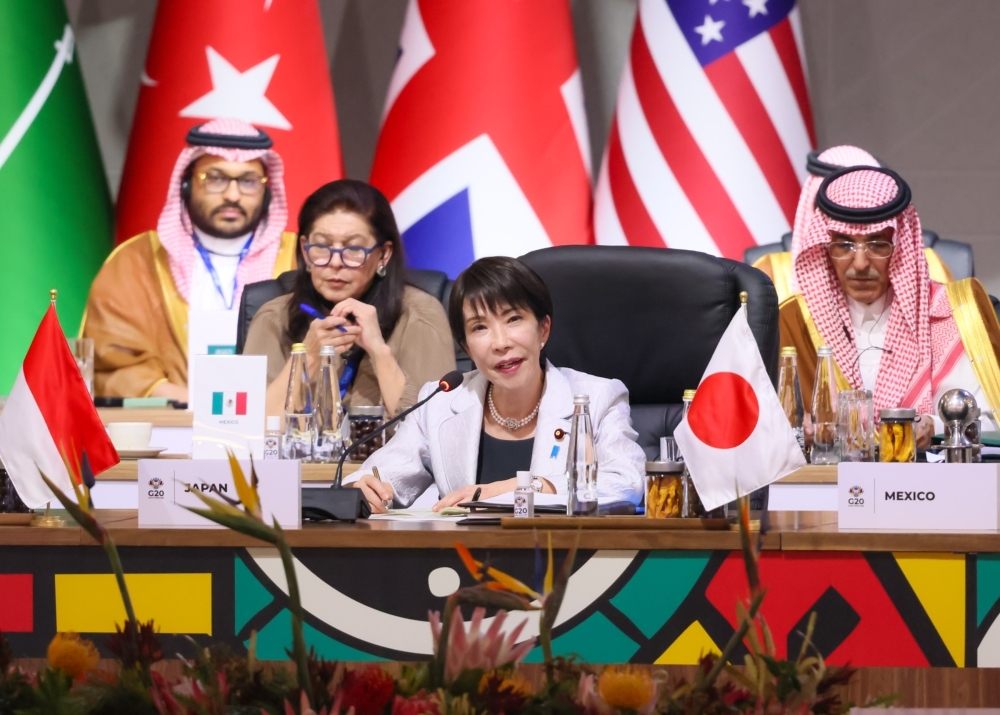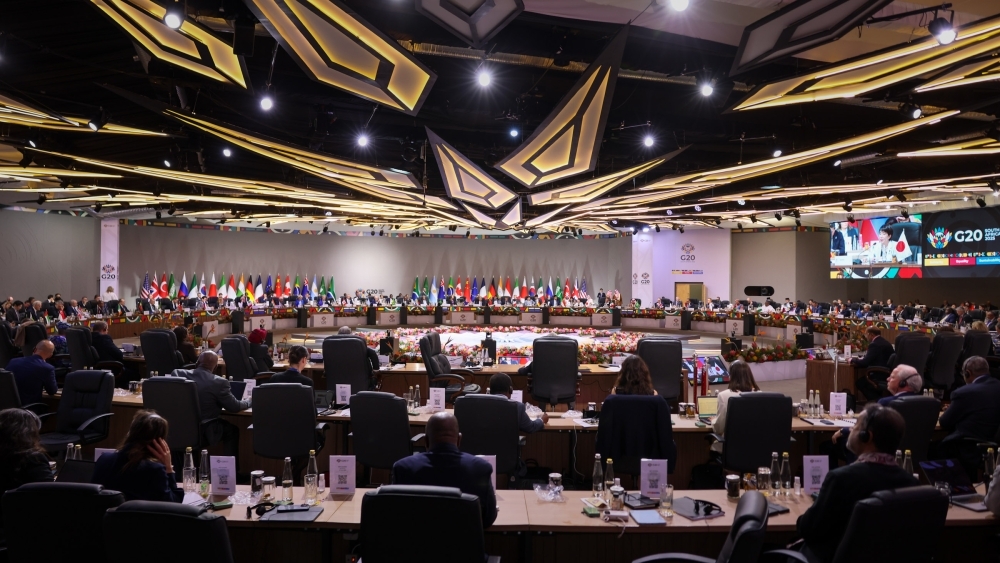G20 (Summit on Financial Markets and the World Economy)
G20 Johannesburg Summit
Session 1 “Inclusive and Sustainable Economic Growth that Leaves No One Behind”
 (Photo: Cabinet Public Affairs Office)
(Photo: Cabinet Public Affairs Office)
 (Photo: Cabinet Public Affairs Office)
(Photo: Cabinet Public Affairs Office)
On November 22, commencing at 10:35 a.m. local time (5:35 p.m. on November 22, Japan time) for approximately 6 hours and 15 minutes, Ms. TAKAICHI Sanae, Prime Minister of Japan, attended the G20 Johannesburg Summit Section 1 “Inclusive and Sustainable Economic Growth that Leaves No One Behind”. The overview of the session is as follows:
In this session, members emphasized the importance of the G20 with shared responsibility acting in a coordinated manner to ensure inclusive and sustainable global growth amid growing uncertainty surrounding the global economy and the various challenges facing the international community. Members also pointed out the need to ensure free and fair trade, WTO reform, and development finance that sufficiently considers debt sustainability, in addition to the importance of achieving a just and lasting peace in Ukraine, and the need to improve the humanitarian situation as well as promoting early recovery and reconstruction in Gaza.
At the Opening Session prior to the Session 1, the G20 South Africa Summit: Leaders’ Declaration was issued.
Prime Minister TAKAICHI’s statement is outlined as follows:
- Amidst the multiple crises the international community is facing, now is the time for the members of the G20 to address challenges and to build global governance in a way that all members share responsibility.
- International Situation
- Peace is indispensable for achieving economic growth. Russian Federation’s aggression against Ukraine is an outrageous act that shakes the very foundations of the international order. It is important to achieve a just and lasting peace in Ukraine through diplomatic efforts by various countries under the unity of the international community. Japan will continue to provide strong support to Ukraine, including financial assistance for recovery and reconstruction in cooperation with international organizations including the World Bank.
- Japan welcomes the adoption of the United Nations Security Council resolution (UNSCR) 2803 on the situation in Gaza. It is important for the international community to unite in efforts towards maintaining the ceasefire, stabilizing the security, and rebuilding Gaza. Japan will play its proactive role to advance the “Comprehensive Plan”, improve the humanitarian situation, promote early recovery and reconstruction, and further advance one step closer toward the realization of a two-state solution.
- Building the Economy, The Role of Trade
- Amid heightened uncertainty surrounding the global economy, the G20, which accounts for over 80 percent of the world’s GDP, has a great responsibility for global economic growth. To address individual economies’ imbalances that underlie the excessive global imbalances, countries with current deficit should take actions to ensure fiscal sustainability, while countries with current surplus should eliminate non-market policies and practices.
- It is important to develop a rules-based, free, and fair international economic order and to link it to global economic growth as well as the realization of a free and open Indo-Pacific (FOIP). The multilateral trading system, with the World Trade Organization (WTO) at its core, serves as the foundation of the world economy. Japan will actively contribute to discussions on WTO reform, including its decision-making process, and Japan will continue to take the lead in discussions on the expansion and upgrading of the Comprehensive and Progressive Agreement for the Trans-Pacific Partnership (CPTPP).
- International Development Finance, including Debt Issues
- In order to meet the enormous need for development finance, it is necessary to mobilize domestic resources, promote private investment, and expand the donor base. Japan has expanded Japan International Cooperation Agency (JICA)’s financial instruments to further encourage private investment, enabling JICA to acquire bonds and provide credit guarantees for companies in developing countries. Japan will host an international conference in Tokyo next March focused on building capacity for domestic resource mobilization. Japan will continue to cooperate in further enhancing the efficiency and effectiveness of support provided by multilateral development banks.
- To achieve quality growth, it is essential to adhere to international rules and standards such as inclusiveness, transparency, and fairness, and to ensure infrastructure development that sufficiently considers debt sustainability. Japan will promote quality infrastructure investment in line with the G20 Principles for Quality Infrastructure Investment adopted in 2019. Regarding debt issues, we need to enhance the implementation of the debt restructuring process under the G20 Common Framework and to enhance debt transparency. Japan calls on all G20 members to participate in the World Bank’s debt data sharing exercise.
- In this year marking the first-ever G20 Summit to be held in Africa, Japan hosted TICAD 9 in August and set up “Economic Region Initiative of Indian Ocean-Africa”, to advance human resource development, including youth and women, strengthening of industrial capacity, and strengthening of connectivity within and beyond the region, by involving the vitality of the private sector, and affirmed the commitment of Japan and Africa on working together to address various challenges facing the African continent.
- Japan will work together with G20 members to uphold and strengthen a free and open international order based on the rule of law, and to rebuild responsible global governance.


